Release Policy
Introduction
This document describes in detail the Eleveo product release policy that has been in place since 2019. The two release models available for customers to follow are:
Cloud Feature To Market Version (CLOUD) – Any version listed as CLOUD is provided as a Software as a Service. Updates to the feature set appear on a continuous basis. Configuration and implementation are provided as a service by the Eleveo Service and Support team. Targeted primarily at customers using cloud-based recording solutions, this version can also be deployed as a hybrid solution.
Feature To Market Version (F2M) – An on-premise version where a regular release schedule will be followed. Customers who deploy a F2M version on-premise will benefit from cutting-edge technological enhancements and new features being released at regular intervals. Infrastructure requirements may change as new features are added!
Long-Term Supported Version (LTS) – Any on-premise version listed as LTS will be supported for at least two years. LTS versions and the time frame that they will be supported are listed on the help portal. LTS versions provide customers the benefit of stable infrastructure requirements, essential bug fixes and regular maintenance support – for a period of two years. No new features will be added to an LTS version during this time frame! Hardware Requirements will not change when a minor update or patch is applied to the LTS version!
Eleveo 9 is a Cloud-Only F2M Version. This version is automatically upgraded at regular intervals.
Purpose
This document has been written to ensure that all users are aware of the policies and guidelines Eleveo follows regarding the updated life cycle policy as of 2023, namely the release to the market and the termination date of various versions of Eleveo’s products. By clarifying these policies, users are empowered to make decisions relating to the maintenance and upgrades of Eleveo products so that they can take advantage of the full functionality on offer.
Terminology
Customer | An individual or organization which uses Eleveo products. |
|---|---|
End of Maintenance (EOM) | The date on which maintenance will end and the last Patch Version will be distributed. |
End of Support (EOS) | The date on which support for a specified version will no longer be provided. |
Last Order Date (LOD) | The date on which the last orders for the version will be taken. |
Patch Release | These are releases of a product version that involve minor alternations to fix bugs that have been reported. These are indicated by the following versioning: “X.Y.Z” where the final digit is greater than 0. Example: 6.4.2 |
Minor Release | These are releases of new versions of a product including new features, enhanced technology and functionality. These are indicated by the following versioning: “X.Y.0”, where the Y (middle digit) is incrementally higher. Example: 6.5.0 |
Major Release | A Major Release is a release of a product that contains a specific feature set or introduces a significant change in software or technology that breaks backward compatibility. Versions are defined by the first digit of a version number EG: 6.X.X = Version 6. Each version has at least one Minor Release (see above) where new features are made available to the Customer, and several Patch releases (see above). |
Build number | Indicates the currently installed build. This number references the current feature set and/or bug fix that is currently installed. It may be requested by our support engineers. |
Partner | An individual or organization that resells or distributes Eleveo products either as a separate solution or integrated into another solution either as a separate piece of software or under a partnership agreement. |
Technology | Form, operation and implementation of components in a product. |
Cloud Feature To Market Version (CLOUD) | A fully configured and functional solution is provided as a service by Eleveo. The Cloud version contains the most up-to-date feature set, and follows a regular software release cycle. This provides early adopters with the opportunity to take advantage of new features as they are developed. Regular updates will ensure clients have not only regular bug fixes but market-leading technology available as it comes available. Customers gain access to a cloud-based Quality Management solution for their recorded media. Please get in touch with your local Eleveo representative for a detailed breakdown of what is supported in the cloud. |
Feature To Market Version (F2M) | A regular software release cycle will provide early adopters with the opportunity to take advantage of new features as they are developed. Regular updates will ensure clients have not only regular bug fixes but market-leading technology available as it comes available. Customers can benefit from regular updates, market-leading technology and industry-leading support. |
Long Term Supported Version (LTS) | An installation that does not change in infrastructure requirements for a defined period of time, only regular bug fixes will be provided as patches or minor upgrades to the existing configuration. All new features will be developed only for the Feature to Market Version. Customers with regular maintenance contracts and technical support will experience the same levels of support as normally provided to all customers. At the end of the defined period, customers will be expected to upgrade to the newest version supported by Eleveo at that time. |
Detailed Description of the Varying Policies
Irrespective of which software release cycle chosen, Eleveo remains dedicated to providing exceptional customer service and support. The primary difference for end users will be the stability provided by the LTS version OR access to new features as they become available. Customers who prefer stability in infrastructure requirements or who do not require that new features be deployed with every release should choose the LTS option.
Cloud Feature To Market Version
Eleveo provides WFM and WFO as a service for customers using cloud-only recording solutions and for those customers who wish to have early access to new features but do not want to expand their current hardware footprint. An Eleveo Cloud deployment does away with the need for on-premise hardware as it is deployed and maintained by the Eleveo Service and Support team in a secure Eleveo cloud. Clients who wish to take advantage of new features as they are available can take advantage of the Cloud version. Regular releases (both minor and major) will enable users to take advantage of new features as they are developed. For more details and information about changes, or to hear more about upcoming cloud-based features, please contact your local Eleveo representative.
Feature To Market Version (F2M)
Smaller - or more demanding - clients who wish to take advantage of new features as they become available and who do not mind being obliged to increase their hardware footprint occasionally should take advantage of the Feature to Market Version cycle. Regular releases (both minor and major) will enable this release track to take advantage of new features as they are developed, with minor versions providing regular bug fixes. As new features are developed or as new back-end processes are deployed, there may be an increase in Hardware Requirements between releases, both major and minor. Eleveo undertakes to inform Partners at the earliest possible opportunity of these changing requirements. However, performance may be affected after an upgrade is performed if the additional hardware requirements are not met in a timely manner.
Long-Term Supported Version (LTS)
The requirement that customers purchase or requisition additional resources between releases may be onerous for some corporate clients who do not require new functionality immediately as it becomes available. For customers who have a specific calendar that defines their server downtime this LTS model will reduce the time taken to perform an update. Deploying an LTS version may be desirable as it will ensure stability in hardware demands, while it will also provide bug fixes at regular intervals. No new features will be added to the LTS version! It will be distributed as is, with only critical bug fixes being provided in the form of a patch. If a customer wishes to enhance their installation to take advantage of a new feature they will have to install the F2M version. Corporate clients with long lead times on installation as well as existing corporate clients may wish to follow this model as there will be no major change in the code between patches. There will be no exception to the rule that: New features will be deployed only for the F2M version.
Hybrid Deployments
Eleveo Version 9 - 9.3 are Cloud-based Software as a Service installations. As these versions are cloud-only, they do not fully support on-premise features. In order to support customers and provide access to both the existing feature set and new features in these cloud only versions, we support hybrid installations.
A hybrid installation contains two separate installations connected via the Eleveo cloud connect tool.
The on-premise server is installed and configured using Eleveo version 8 software,
Cloud connect then sends media and metadata to the cloud installation (version 9).
A hybrid installation is required when legacy recording or on-premise recording is deployed.
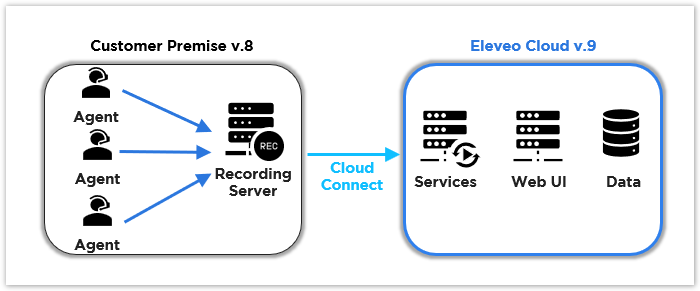
Support Timeline
The Eleveo CLOUD development cycle closely mirrors the release cycle for the standard Feature To Market Version (F2M). With new features and bug fixes being applied at regular intervals.
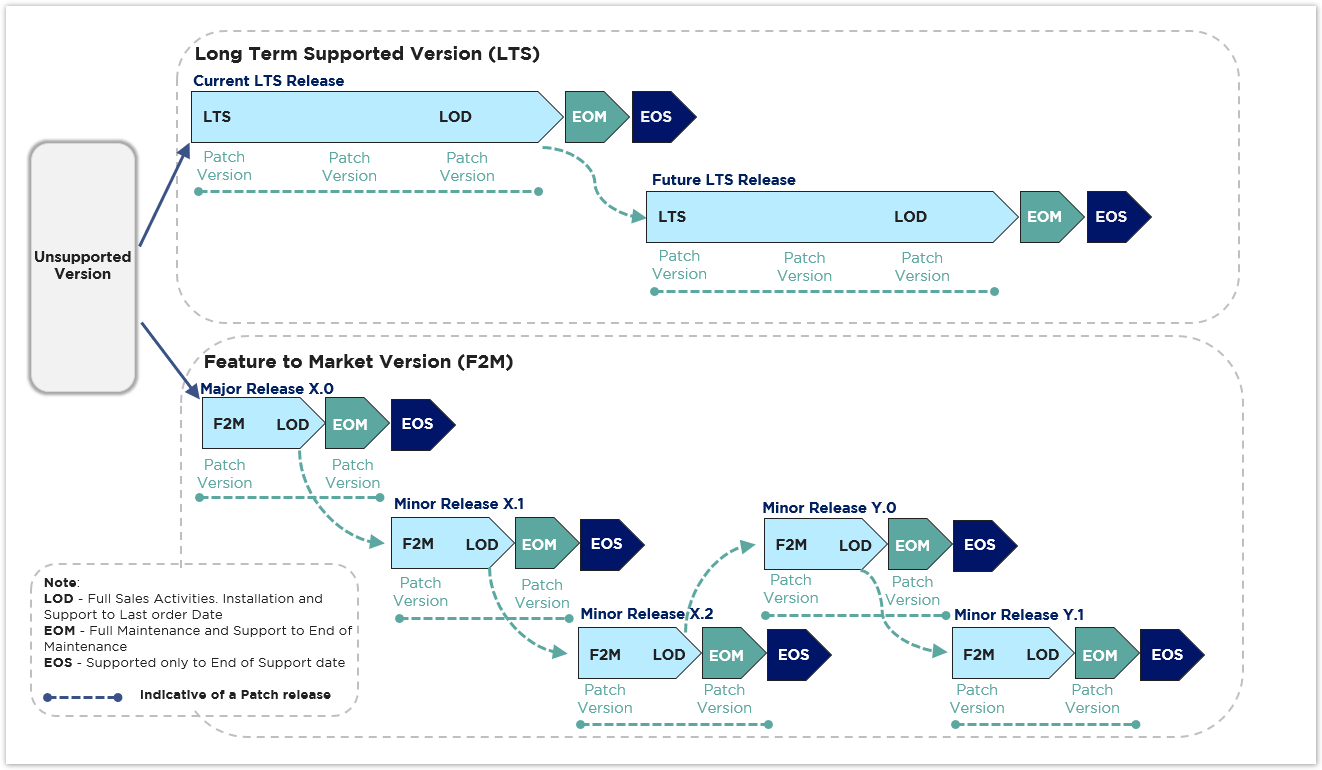
General Rules
We aim to ensure forward compatibility during the lifecycle of a major version(subject to certain restrictions). Most minor versions or patches can be installed on any older version throughout the same release model without breaking the existing functionality. A new version of a package may require the installation of additional packages as a prerequisite for the F2M Release model.
Eleveo supports the whole major release as such, e.g. 8.x. However, customers are required to stay on one of the supported minor releases in order to keep the maintenance contract active.
Example:
We will provide support only for a limited number of major release candidates. Usually, only one on-premise LTS and one on-premise F2M version will be supported at a given time.
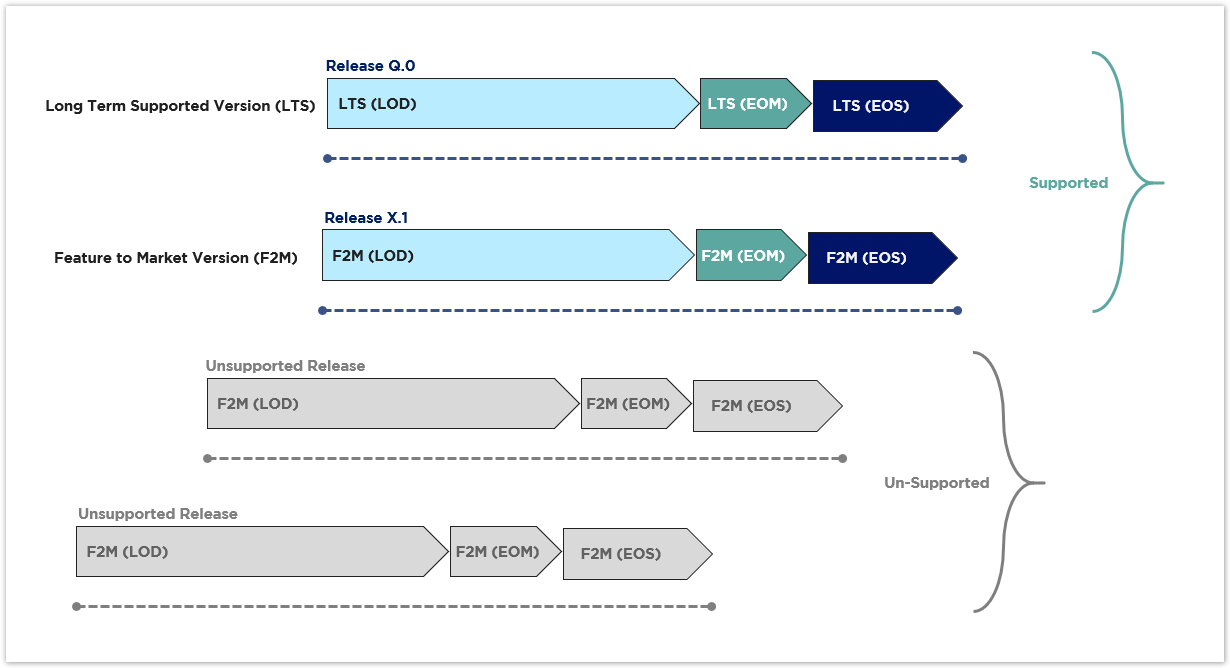
Release Timeline
Each model has a slightly different timeline for the release and update schedule. Both result in regular bug releases along the following lines:
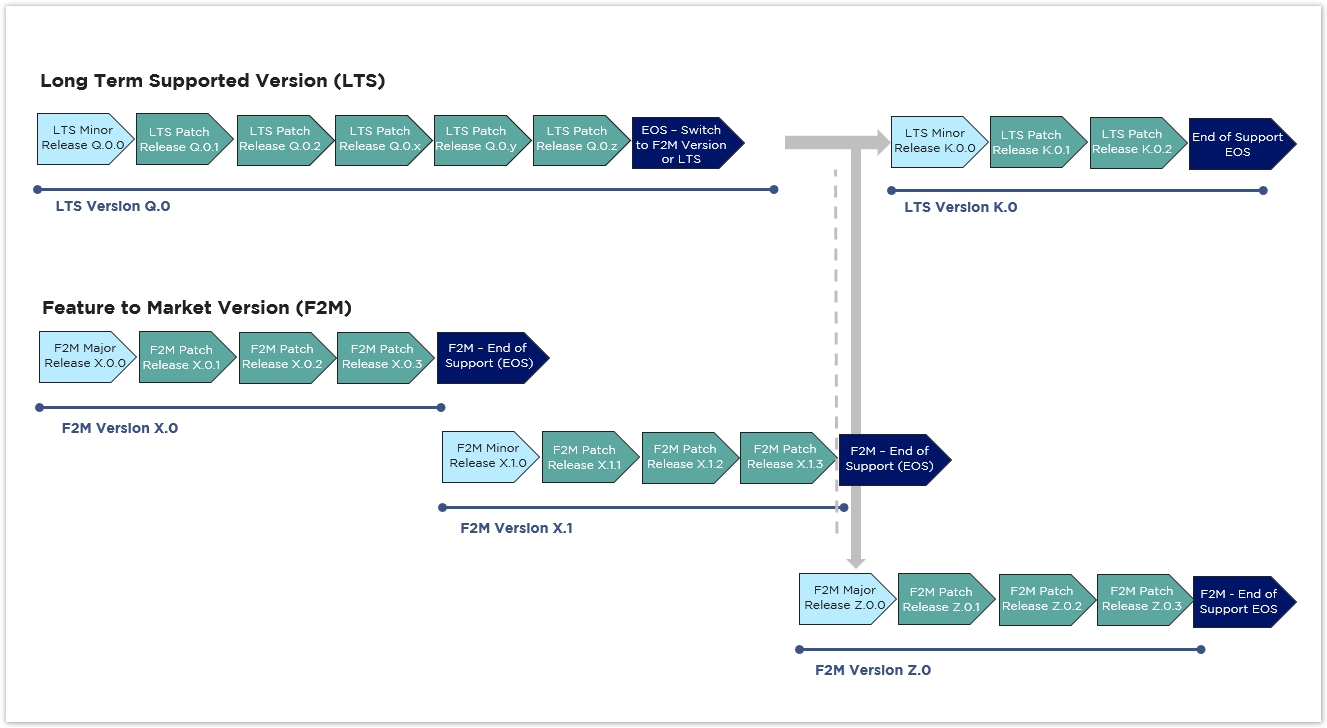
Timeline – Long-Term Supported Version (LTS)
The LTS release model will be supported for a period of two years. It is anticipated that any customers using the LTS version will be upgraded to the most up-to-date version at the end of the two-year cycle.
Within this LTS version the following release format is expected to be followed:

Major Release
This LTS Version is supported for, at minimum, 24 months, irrespective of the actual minor or patch version number.
Minor Release
Minor releases. There will be no minor release provided for the LTS version. If new features are required by a customer, they will have to upgrade to a newer version. This may result in the need for regular updates.
Patch Release
Patch releases are produced approximately every 3-6 months. All patch releases are backward compatible. Patch releases provide only bug fixes. A new version of a package may require the installation of additional packages as a prerequisite. Example naming convention: X.X.0, → X.X.2,→ X.X.3
Timeline – Feature To Market Version (F2M)
The F2M version release model will be supported for a variable period of time. In general, it is anticipated that customers deploying the F2M model will be upgraded to the most up-to-date version at the end of the two-year cycle.
Within this F2M version the following release format is expected to be followed:
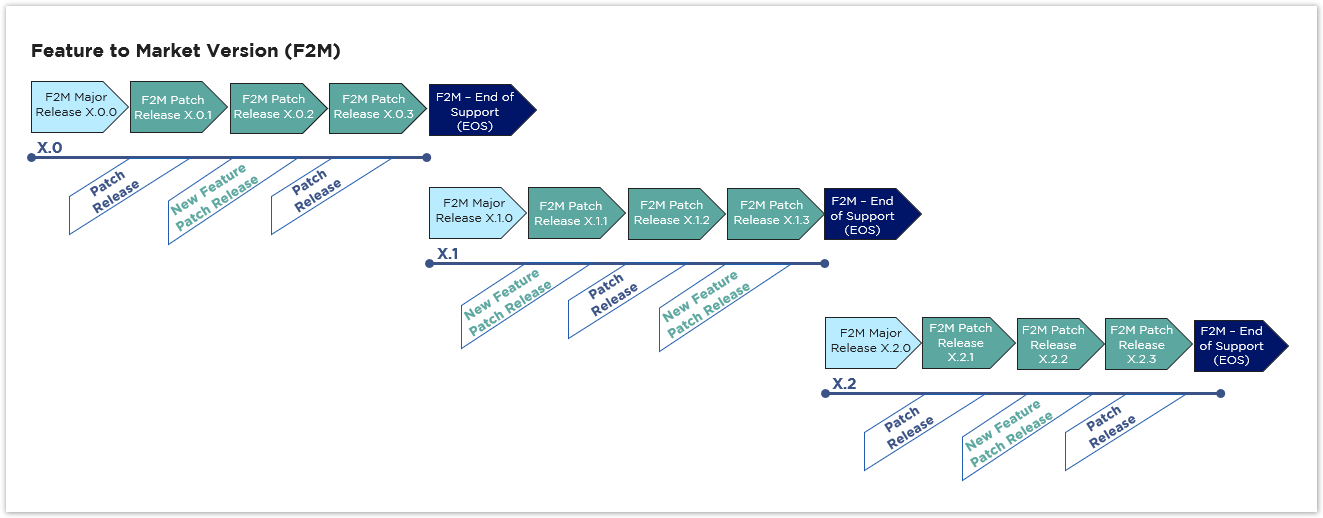
Major Release
Only the most recent release is supported, irrespective of the actual minor or patch version number. Major releases are provided regularly when we release significant new functionality, a significant technology update comes available or when it is no longer possible to guarantee backward compatibility. Example naming convention: 6.0.X, 7.0.X
Minor Release
Minor releases are produced approximately every 3-6 months. All minor releases within the same version are backward compatible. Minor releases from different versions are not backward compatible (e.g. ver. 5.Y.Z is not compatible with Version 6.Y.Z). Each minor release brings new functionality in addition to bug fixes. A new version of a package may require the installation of additional packages as a prerequisite. Example naming convention and upgrade path: X.2.X → X.3.X
Only the most recent release will be supported!
Patch Release
Patch releases are produced approximately every 3-12 weeks. All patch releases within the same minor release are backward compatible. Patch releases generally only provide bug fixes. A new version of a package may require the installation of additional packages as a prerequisite. Example naming convention and upgrade path: X.X.0, → X.X.1,→ X.X.2
Patching
Minor enhancements required to resolve known issues or resolve software bugs will be resolved in the most recent patch version.
If the Customer applies a patch, it may happen that the new functionality appears in the code when following the F2M model.
Upgrading between major versions may require multiple steps!
Long Term Supported Version (LTS)
LTS bug fixes will be provided in the form of an ISO image. They will not lead to enhanced hardware demands and will not provide additional (new) functionality.
Feature To Market Version (F2M)
F2M bug fixes will be provided in the form of an ISO image. They may lead to enhanced hardware demands and may provide additional (new) functionality.
Exceptions
Eleveo reserves the right to depart from the life cycle policy shown above in the following situations:
Situations may arise between patch releases within a version where the technology that provides certain functionality is replaced by newer technology providing the same functionality. In these cases, the older technology will no longer be supported for the affected version once the newer technology has been released.
Situations arise where fixes for a certain bug may require a change in the version’s technology. In these situations, the fix for the bug mentioned will be incorporated into the next version.
Where the release cycle between versions has been extended or curtailed, this may reduce or prolong the lifecycle of previous versions from the periods specified above.
Where such departures are likely to occur, Eleveo undertakes to inform Partners at the earliest possible opportunity.
